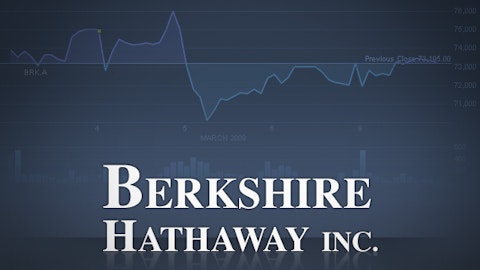Until that time comes, however, nobody can be positive that Berkshire’s future management team will be able to even partially replicate the success of the unrivaled team that is Buffett and Charlie Munger.
Without a doubt, Buffett has done marvelously well investing both Berkshire’s shareholder equity and insurance float in stocks. Over the years, Buffett has amassed enormous positions in now-legendary stocks such as The Coca-Cola Company (NYSE:KO), American Express Company (NYSE:AXP) , Wells Fargo & Co (NYSE:WFC), and The Procter & Gamble Company (NYSE:PG). Sure enough, take a look at what Buffett’s patience had achieved with these four stocks as of the end of 2012:
| Company | Shares | % of Company Owned | Cost | Market Value |
|---|---|---|---|---|
| American Express | 151,610,700 | 13.7 | $1.29 billion | $8.72 billion |
| Wells Fargo | 456,170,061 | 8.7 | $10.91 billion | $15.59 billion |
| Procter & Gamble | 52,477,678 | 1.9 | $336 million | $3.56 billion |
| Coca-Cola | 400,000,000 | 8.9 | $1.3 billion | $14.5 billion |
Source: Berkshire 2012 Annual Shareholder Letter
Of course, Buffett has been busy preparing his value-investing proteges in Todd Combs and Ted Weschler to take over the portfolio once he’s gone. However, thanks again to Berkshire’s enormous size (and much like the management uncertainties I outlined a moment ago), investors won’t be able to count on seeing Berkshire achieve these types of incredible equity portfolio returns down the road.
5. Underwriting losses
Because Berkshire runs enormous insurance operations through its subsidiaries in GEICO, General Re, and Berkshire Hathaway Reinsurance Group, the company is also subject to insurance risks, including natural disasters and acts of terrorism.
Putting aside the fact Berkshire has admittedly operated at an underwriting profit for the past 10 consecutive years, if a truly catastrophic event were to occur, Buffett’s company would almost certainly feel the hurt.
6. Non-insurance business losses
As is the current case with the rest of Berkshire’s operations, its non-insurance businesses also seem to be firing on all cylinders as America continues to exit its most recent financial crisis. To be honest, given the enduring nature and diversity of Berkshire’s outstanding non-insurance subs, I have a hard time picturing a scenario where any one of these companies could fold; the largest of them are composed of Burlington Northern, metalworking company Iscar, chemical specialist Lubrizol, manufacturing equipment maker Marmon, and MidAmerican Energy. More recently, remember, Buffett acquired 50% of H.J. Heinz Company (NYSE:HNZ) in a joint deal with investment firm 3G Capital.
Even then, we should never say never, right? Should the country once again dive into another brutal recession, Berkshire’s non-insurance businesses would at the very least suffer from an earnings standpoint.
Foolish final thoughts
In the end, given everything Warren Buffett has done to expand Berkshire’s businesses and moat, I’m tempted to believe I’m more likely to win the lottery than to actually see Berkshire fail in all these areas simultaneously over the long run. As a result, short of Armageddon or total anarchy, it’s a safe bet that Berkshire Hathaway will probably be around for the foreseeable future.
The article 6 Ways Berkshire Could Fail originally appeared on Fool.com.
Fool contributor Steve Symington has no position in any stocks mentioned. The Motley Fool recommends American Express, Berkshire Hathaway, Coca-Cola, H.J. Heinz, Procter & Gamble, and Wells Fargo and (NYSE:WFC) owns shares of Berkshire Hathaway and Wells Fargo.
Copyright © 1995 – 2013 The Motley Fool, LLC. All rights reserved. The Motley Fool has a disclosure policy.


